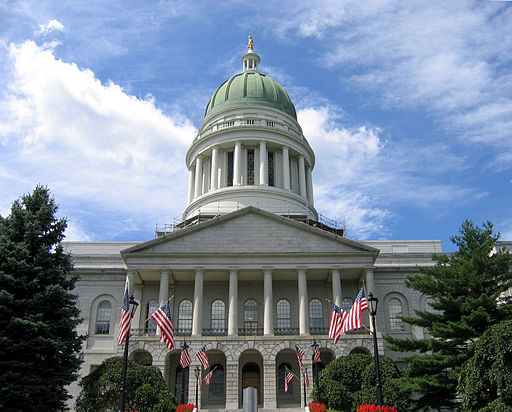On November 2, 2021, voters in Maine will decide a ballot initiative to prohibit the construction of electric transmission lines in the Upper Kennebec Region, including the New England Clean Energy Connect (NECEC), which began construction in the region on May 13. The ballot initiative would also require a two-thirds vote of each state legislative chamber to approve electric transmission line projects defined as high-impact.
The NECEC is a 145-mile long, high-voltage transmission line project that would transmit around 1,200 megawatts from hydroelectric plants in Quebec to electric utilities in Massachusetts and Maine. Segment 1 of the NECEC is a new corridor from the border with Quebec through the Upper Kennebec Region. The remainder of the NECEC would utilize an existing transmission corridor.
No CMP Corridor is leading the campaign in support of the ballot initiative. The PAC Mainers for Local Power is also registered to support the ballot initiative. Together, the PACs had raised $7.75 million, including
- $4.98 million from NextEra Energy Resources, LLC, which owns a natural gas-fired plant in Cumberland, Maine, and six solar fields or projects in southern and central Maine;
- $1.26 million from Vistra Energy Corp., which owns a natural gas-fired plant in Veazie, Maine; and
- $1.22 million from Calpine Corp., which owns a natural gas-fired plant in Westbrook, Maine.
Clean Energy Matters is leading the campaign in opposition to the ballot initiative. The PAC Hydro-Québec Maine Partnership is also registered to oppose the ballot initiative. Together, the PACs had raised $31.56 million, including
- $22.14 million from Central Maine Power (CMP), NECEC Transmission LLC, and the companies’ parent firm Avangrid; and
- $8.28 million from H.Q. Energy Services (U.S.) Inc., which is a subsidiary of Hydro-Québec.
Hydro-Québec is a state-owned corporation wholly owned by the Province of Quebec. In 2020, 25 current and former state legislators sent a letter to Quebec Premier François Legault and Hydro-Québec CEO Sophie Brochu, which said, “Hydro-Quebec provides billions of dollars annually to its sole shareholder, the Province of Quebec, which means that the residents of Quebec have a direct financial stake in the outcome of the CMP corridor referendum. … If the shoe were on the other foot and Maine voters were directly connected with a campaign to overturn public opinion on a construction project in Quebec, we would hear protests from the people of Quebec.”
Serge Abergel, the director of external relations for Hydro-Québec, responded to the letter, stating that Hydro-Québec should be allowed to provide information to voters after spending years to obtain permits. Abergel said, “So once you want to take that away, at least give us the right to give the facts when it comes to us. We don’t view this as a loophole at all. We’re compliant to the rules, and we’re just trying here to give a straight story, so people can understand and make their own choices.”
Proponents of the ballot initiative submitted 95,622 raw signatures on January 21, 2021. Former Sen. Thomas Saviello (R-17) filed the ballot initiative. On February 22, 2021, Secretary of State Shenna Bellows (D) announced that 80,506 signatures were valid. The minimum requirement was 63,067 valid signatures.
The ballot initiative is the only initiated statute on the ballot for the election on November 2, 2021. The Maine State Legislature could still refer general obligation bonds to the ballot. It is also considering at least three constitutional amendments and a referred statute to create a consumer-owned electric transmission and distribution utility. The legislature adjourned its special session on June 17 but will reconvene on June 30.
Additional reading:


